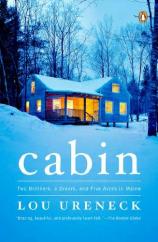Cabin: Two Brothers, a Dream, and Five Acres in Maine
Review
Cabin: Two Brothers, a Dream, and Five Acres in Maine
Lou Ureneck is a journalism professor who has built a cabin in the Maine woods, in small but significant ways recalling Henry David Thoreau. His book is uplifting and informative, bringing us along on an inner journey towards a physical and metaphysical goal.
"[Lou Ureneck's] book is uplifting and informative, bringing us along on an inner journey towards a physical and metaphysical goal."
To begin to build the cabin took time --- his lifetime up to that point, especially the sorrows and loss of his accumulated experience, and the hope that remained for a worthwhile outcome. Following a divorce and the death of his mother, and a couple of cardiac incidents, Lou says, “The idea had taken hold of me that I needed nothing so much as a cabin in the woods.”
The land was purchased, five acres with a pond, and the lumber had been accumulated, though it was old and warped. He tried to buy a collection of old-fashioned windows and ended up getting them for free. His plan morphed from a one-room sort of affair to something with two stories, a wing, a porch and a complex roofline.
The joy of creation came from working with his brother Paul and some of the younger men in their families. The book, as the subtitle suggests, is about the two brothers and how they interacted as they took on this shared task. For Lou, the cabin was an idyllic dream scene for writing and relaxing, and for Paul, it became an escape hatch when problems arose in his marriage. Utilizing their different kinds of energies became a dance that the two brothers did, with and around each other, with each new challenge.
As he built, Lou learned more about the local landscape and his neighbors. He had to get permission for a smaller driveway and in the process met the town councilors. When the foundation pillars were being dug, he got to know his land better: water-logged, requiring a pump to get the cement poured. He couldn’t do a lot during the winter, of course, so he fished and explored when he wasn’t building. He had to work on the place when he had breaks from teaching, and not every visit to the cabin site was for construction. Being something of an introvert, Lou’s solitary forays were valuable and rewarding, allowing him to observe the changing weather and the passing of the year. The book is also a retrospective of his childhood and early relationship with Paul, and casts a net farther into the past, calling up the ghosts of previous occupants of the five-acre tract.
Like Thoreau, Lou spent his first night in the cabin when it was unfinished. Thoreau: “…my house was not finished for winter, but was merely a defence against the rain, without plastering or chimney, the walls being of rough, weather-stained boards, with wide chinks, which made it cool at night.” Ureneck: “There was still no roof cover, and the walls remained unsheathed. In other words, it was a frame, open to the weather.”
The cabin becomes a family gathering place against the storms of life (as when Paul finally confesses that his marriage has collapsed). It is a physical reality and a symbol of shared responsibility, quiet enjoyment, and brotherly cohesion. By the end, Lou has started an orchard, another signal of hope’s triumph over life’s adversities.
Reviewed by Barbara Bamberger Scott on September 22, 2011
Cabin: Two Brothers, a Dream, and Five Acres in Maine
- Publication Date: November 27, 2012
- Genres: Nonfiction
- Paperback: 256 pages
- Publisher: Penguin Books
- ISBN-10: 0143122088
- ISBN-13: 9780143122081




